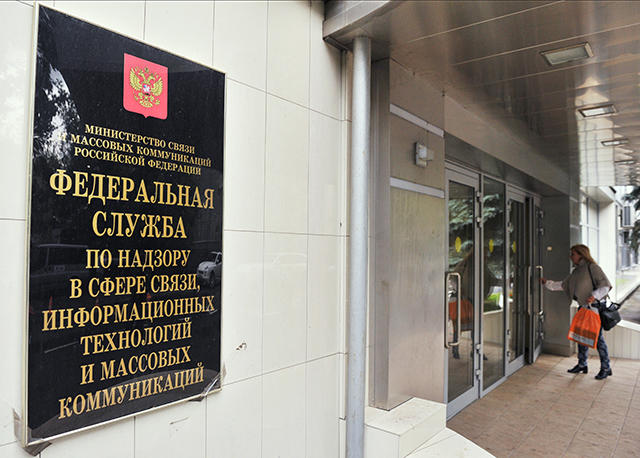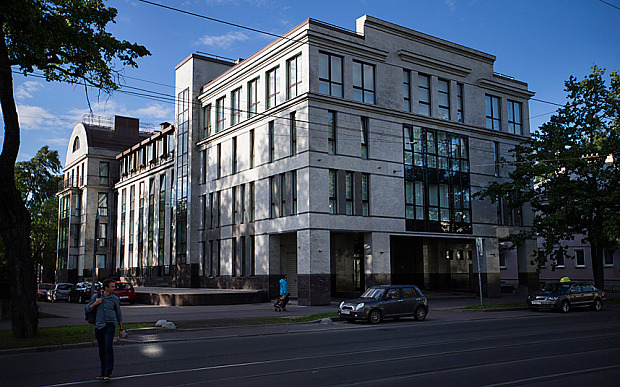By Guest Blogger
As part of Russia’s authoritarian turn following Vladimir Putin’s return to the presidency in May 2012, the Kremlin has launched an unprecedented crackdown on the Russian Internet. A barrage of restrictive new laws, the blocking of websites critical of the government, the prosecution of Internet users for political expression, the mobilization of a pro-government troll army, and the attempted intimidation of international tech companies have all had one aim: asserting state control over the RuNet.
In modern Russia, social media and the Internet constitute a key pillar of civil society, facilitating independent organization and providing a platform for open political debate. Increasingly unwilling to tolerate the continued existence of a public space outside its authority, the Russian government has deployed a range of tactics to undermine Internet freedom in recent years.
The RuNet Blacklist
The creation of the RuNet blacklist, and the rise of the now infamous agency responsible for administering it, Roskomnadzor, marked a significant step in the crackdown. In late 2012, new legislation granted officials the right to ban websites harmful to children, such as those containing child pornography or promoting drug use or suicide, without a court order. The law’s scope was soon expanded to cover content deemed “extremist” as well, however, as many activists had feared it would be.
The first use of the law for political censorship came in March 2014, around the time of Russia’s annexation of Crimea, when several prominent websites critical of the government were banned. These included the popular LiveJournal blog of anti-corruption activist and opposition leader Alexey Navalny and the well-known political news sites grani.ru, kasparov.ru, and ej.ru. To date, over 26,000 websites have been blacklisted according to statistics compiled by a leading Russian digital rights organization, although only a fraction of these are instances of political censorship.

Russia’s Federal Service for Supervision of Communications, Information Technology, and Mass Media, known by its Russian acronym “Roskomnadzor,” is the state agency responsible for administering the RuNet blacklist. (Photo: Sergey Kiselev/Kommersant)
The Russian government has also targeted various methods used to circumvent online censorship, albeit with limited success. More sophisticated RuNet users have increasingly adopted anonymizing tools to mask their identities and location. The Tor Project, the group behind the popular Tor anonymity network, reports an increase in the number of its Russian users from 20,000 to more than 200,000 over the last four years. In July 2014, the Russian Interior Ministry set a 3.9 million ruble prize ($110,000) for devising a way to decrypt data sent over Tor. The prize money went uncollected.
Many Russians have also continued accessing banned content by simply visiting mirror websites or downloading mobile applications. Not surprisingly, state censor Roskomnadzor recently announced plans to work on developing the capacity to block mobile apps for iOS and Android, but this remains beyond the agency’s reach for now. Apparently frustrated by its inability to counter many of the methods being used by Russians to access blocked content on a technical level, Roskomnadzor proposed a legislative amendment in March introducing fines for posting “propaganda” about circumvention tools online.
Prison Time for Social Media Posts
In addition to censoring the web, the Russian government has also stepped up its prosecution of RuNet users for political expression. In summer 2014, several new laws came into force aimed at repressing political speech online. The “bloggers law” imposed the regulations faced by official media outlets on any website with a daily audience of more than 3,000 people, thus opening up popular bloggers to criminal prosecution for obscene language, libel, or other violations. The “law against retweets” allowed for 5-year prison sentences for the re-dissemination of “extremist” content online.
Toward the end of 2015, a slew of court rulings handed down real prison terms for the posting and sharing of politically controversial views. In September, Tatar activist Rafis Kashapov was found guilty of calling for separatism and inciting ethnic hatred, and sentenced to 3 years behind bars, after posting several articles on his VKontakte page harshly criticizing Russia’s annexation of Crimea and actions in eastern Ukraine. In recognizing Kashapov as a political prisoner, the human rights group Memorial described his prosecution as being undertaken exclusively in connection to Kashapov exercising his right to free expression, with “no calls for violence” in the incriminating texts.

Tatar activist Rafis Kashapov was sentenced to 3 years in prison in September 2015 for several posts to the Russian social media site VKontakte.
In December, Darya Polyudova received a 2-year jail sentence in Krasnodar on charges of inciting extremism and separatism, derived from three posts she published on her VKontakte page related to Ukraine. Human Rights Watch categorized the ruling as “one in a growing number of cases where Russians are being punished for speaking their mind.” Later that month, Tomsk blogger Vadim Tyumentsev was charged with inciting hatred and extremism and sentenced to 5 years in prison after he posted videos to VKontakte and YouTube alleging corruption by local officials, calling for nonviolent protest, and criticizing Russia’s actions in Ukraine. In its ruling, the Tomsk court also banned Tyumentsev from publishing any content online for three years following the end of his sentence.
In total, more than a dozen RuNet users have been thrown in jail on similar charges from among the several hundred who have faced criminal cases for expression of their political views online over the last year.
Taking on Facebook, Twitter, and Google
Beyond attempting to intimidate Russian Internet users, the Russian government has also targeted the major tech companies that control some of the country’s most politically significant digital platforms.
Homegrown companies like Yandex and VKontakte command the largest share of Russia’s Internet market, while the social media sites Facebook and Twitter are most popular among politically active Russians critical of the government and Google plays an important role through its search engine and video-sharing site YouTube. The conflicting desires of these tech companies to tap the growing Russian market while also protecting their users’ rights and privacy, and of the Russian government to control the RuNet without incurring the economic or political costs of blocking popular online services, have led to a delicate balancing act.
Russian government requests for the removal of content, the blocking of accounts, and access to users’ data have been met with varying responses by the major tech companies. The latest Twitter transparency report, covering the second half of 2015, shows a dramatic recent increase in the number of takedown requests submitted by Russia, for a total surpassed only by Turkey. However, of these 1,735 takedown requests, Twitter says it withheld accounts or content in only 5% of cases, most of which violated its policies on child sexual exploitation and abusive behavior. Twitter further specifies that it did not act on several requests to remove tweets with links to videos critical of the government, including one by a prominent opposition figure. Twitter also states it did not disclose any user information in response to requests concerning 87 accounts. Even when Twitter has made controversial decisions to restrict access to content in Russia, such as banning an account run by the Shaltai Boltai hacking group known for leaking sensitive political information, users have been quick to point out the ease with which Twitter allows circumvention of country-specific restrictions by the simple changing of an account’s country setting. (Conversely, you can verify that @boltai is still blocked for Russian users by toggling your account’s country setting.)

Alexander Zharov, head of Russian state censor Roskomnadzor, meets with Colin Crowell, Twitter’s VP and Global Public Policy director, in Moscow. (Photo by Roskomnadzor)
Google reports receiving 1,191 removal requests from the Russian government over the first half of 2015, mostly concerning user content posted through YouTube or Blogger. Marking an all-time high, this continues a trend of dramatic growth in removal requests from the Russian government following the first half of 2012, when Google received only six. Most of the requests from January to June 2015 concerned drug abuse (70%), but others had to do with national security (16%) and government criticism (3%). Google reported complying in about 60% of cases. In Yahoo’s latest transparency report, covering the second half of 2015, the company reported receiving its first requests from the Russian government for the removal of user-generated content. Yahoo said it complied with two of the six requests.
Facebook sparked international indignation in December 2014 when it blocked a page set up to help organize a public protest in support of opposition leader Alexey Navalny at the request of the Russian authorities. Facebook then declined to comply with requests to block similar pages subsequently created for the same protest, however. In Facebook’s most recent government requests report, covering the first half of 2015, the company said it restricted access to 28 pieces of content at the request of the Russian government, without providing specific details. Facebook also said it declined to provide user account data in the one instance it was asked.
The Kremlin has had less trouble getting its way with Russia’s largest social media site, VKontatke, at least since the network’s combative founder and CEO Pavel Durov was forced out in April 2014. Durov’s refusals earlier that year to turn over information on Ukrainian users connected to a Euromaidan protest page and to shut down a page supporting Russian activist Alexey Navalny appear to have been the final straw, following a series of similar clashes. In 2011, Durov had flippantly tweeted a picture of a dog in a hoodie with its tongue out as his official answer to a security service request that he shut down pages related to anti-government protests in Russia. Following Durov’s ouster, the St. Petersburg-headquartered VKontatke is now controlled by state-allied businessmen.
Data Localization and the “Right to Be Forgotten”
The Russian government has so far been frustrated in its attempts to assert a similar level of control over the major tech companies based outside Russia’s borders. When top Russian officials have threatened to block access to widely used sites like Facebook, Twitter, and Google unless they become more responsive to government wishes, the companies have largely called their bluff. This has not, however, stopped the Russian government from introducing a series of new laws aimed at increasing the pressure on the international tech companies.
Russia’s new “right to be forgotten” law, which took effect on January 1, 2016, requires Internet search engines, such as Yandex and Google, to delist links to certain types of “unverified or irrelevant” personal information about individuals upon request, or face potential fines of up to 1 million rubles ($15,000). Russian activists have expressed fears that the law will be abused for political censorship, and many, including Yandex, have advocated for a clause explicitly protecting information of public significance. Yandex reports having already received 3,600 “right to be forgotten” requests over the first three months of 2016, 700 of which it says concerned information that could be considered of public importance. Yandex says it has complied with 27% of the requests.
Russia, in concert with powers like China, has also pushed the concept of “digital sovereignty,” in part through a new law requiring foreign Internet companies to store the personal data of Russian users within the country’s borders. While portrayed as an effort to protect Russians from N.S.A. spying, the data localization law would in effect give the Russian security services direct and unrestricted access to the previously out-of-reach information held by the major US-based tech companies.
The data localization law technically entered into force last September, but a game of cat and mouse concerning its actual implementation continues to unfold between the tech companies and the Russian government. While smaller players like Ebay, PayPal, Booking.com, and Viber have confirmed they will comply with the law, the most important actors, notably Facebook, Twitter, and Google, have remained publicly quiet on the issue, and appear to be holding out. In September, Russian media reported that Apple had rented space in Russia to store the data of Russian citizens, but Apple has not confirmed its intention to comply with the law. Russian Internet freedom activists consider the data localization fight to be a top priority, and have launched an online petition calling on companies not to move the personal data of their users to Russia that has attracted over 44,000 signatures.
Russia’s Troll Army
In the battle for control of the Internet, Russia has also mobilized an army of pro-government trolls in recent years. Numerous investigations into St. Petersburg’s now notorious Internet Research Agency have exposed how “troll factories” employ hundreds of Russians to produce an endless stream of pro-government propaganda online under fake identities. These efforts, ostensibly aimed at shaping public opinion, have also undermined the Internet’s value as a platform for political discussion by flooding online conversations about Russia, such as in the comments section below news articles or through hashtags on Twitter, with annoying and disruptive propaganda.

The former St. Petersburg headquarters of Russia’s most notorious troll factory, the Internet Research Agency. (Dmitri Beliakov/The Telegraph)
More sophisticated trolling has involved politically motivated manipulation of the content moderation systems used by popular sites like YouTube and Facebook. Trolls have abused the fact that these sites allow users to report community standards violations or file copyright claims, which often leads to the automated removal of content, disabling of monetization, or suspension of an account until the case can be manually reviewed. This January, for example, a bombshell exposé on the criminal business practices and ties of Russian prosecutor general Yuri Chaika’s sons, published on YouTube by the prominent anti-corruption group FBK, was briefly removed due to an invalid copyright violation claim. Various independent Russian journalists critical of the government have had their YouTube videos removed or been unable to monetize their work due to the mass reporting of invalid community guidelines violations.
On Facebook, this trolling tactic has become such a problem that a group of prominent RuNet users recently launched an online petition imploring Facebook to address the fact that “the Russian government has learned to subvert the current moderation system and abuse it for its own political gains.” In one example, Facebook temporarily suspended a page dedicated to tracking Russian servicemen killed in action in Ukraine called “Груз 200 (Cargo 200)” following the politically motivated, invalid reporting of community standard violations for graphic images on the page.
The Crackdown Continues
Last week, Alexander Bastrykin, the head of Russia’s Investigative Committee (the Russian equivalent of the FBI), laid out a chilling vision for the future by calling for a stepped-up regime of Chinese-style Internet censorship in Russia. In another ominous sign, the first ever ICT Development & Security Forum for Chinese and Russian government officials is being held in Moscow this week. As part of the opening session on Wednesday, Fang Binxing, known as “the father of China’s Great Firewall,” spoke on the topic of cyberspace sovereignty. “I hope that our Chinese colleagues’ experience in protecting their information space will prove useful for us,” explained the Forum’s organizer in a press release.
While the Russian state’s ability to control the Internet hardly equals that of the Chinese model, in part a legacy of Russia’s political order in the early 1990s as the RuNet was born, the Kremlin does seem intent on moving in China’s direction. Moreover, many Russian activists fear that the government’s ongoing crackdown on the Internet will only accelerate in the lead up to national parliamentary elections this September. After the last Duma elections in December 2011, allegations of electoral fraud sparked mass anti-government protests in Moscow on a scale before unseen in Putin’s Russia, and social media sites played a key role at that time in politicizing Russians and helping them to organize in the streets. The RuNet has been in the Kremlin’s crosshairs ever since, and with another round of national elections now approaching, that is likely where it will stay.


Comments (0)
Comments are closed for this post.